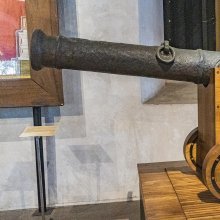Fisherman, Fishermen: 2 definitions
Introduction:
Fisherman means something in the history of ancient India. If you want to know the exact meaning, history, etymology or English translation of this term then check out the descriptions on this page. Add your comment or reference to a book if you want to contribute to this summary article.
Images (photo gallery)
India history and geography
Source: Google Books: Medieval Orissa: A Socio-economic StudyFishermen in ancient India (Medieval Orissa) represented one of the occupational groups commonly found in Townships or Urban centers (nagari).—An example (of Township) is provided by the Nagari plates of Anangabhima III, dated A.D. 1230, which describe an assigned township which contained four large houses of the dimension of royal residences and thirty other houses. The occupational groups present in the settlement were [e.g., a fisherman (kaivartta)]. The range of occupations is large, some of them being rural in character. The context in which the township (or Urban centres—nagari) is assigned suggest that nagaris in such cases were perhaps extended villages, formed out of a cluster of several contiguous villages and thus assuming physical and consequently, economic dimensions much larger than those of an ordinary village settlement.
Source: Singhi Jain Series: Ratnaprabha-suri’s Kuvalayamala-katha (history)Fishermen were commonly depicted on the Saṃsāracakra paintings (representing scenes of human life), in ancient India, as mentioned in the Kathās (narrative poems) such as Uddyotanasūri in his 8th-century Kuvalayamālā (a Prakrit Campū, similar to Kāvya poetry).—Page 185.21 f.: Here follows a description of a printed scroll illustrating the Jaina conception of saṃsāracakra. [...] The saṃsāra-cakra illustrated the three worlds of hell, human world and the world of gods. [For example:] A man entering the sea to save some drowning relation; a man stealing others' money; a fisherman catching a haul of fish with his net

The history of India traces the identification of countries, villages, towns and other regions of India, as well as mythology, zoology, royal dynasties, rulers, tribes, local festivities and traditions and regional languages. Ancient India enjoyed religious freedom and encourages the path of Dharma, a concept common to Buddhism, Hinduism, and Jainism.
See also (Relevant definitions)
Partial matches: Man.
Full-text (+283): Kaivarta, Dhivara, Matsyika, Dhivan, Matsyabandha, Mainika, Kupinin, Chotin, Dhaivara, Nishada, Kaivartaka, Jalika, Matsyabandhin, Dasa, Daladi, Kevatta, Gabida, Kevarta, Kevartta, Mainala.
Relevant text
Search found 121 books and stories containing Fisherman, Fishermen, Fisher-man, Fisher-men; (plurals include: Fishermans, Fishermens, mans, mens). You can also click to the full overview containing English textual excerpts. Below are direct links for the most relevant articles:
The Jataka tales [English], Volume 1-6 (by Robert Chalmers)
Jataka 139: Ubhatobhaṭṭha-jātaka < [Book I - Ekanipāta]
Jataka 34: Maccha-jātaka < [Book I - Ekanipāta]
Jataka 114: Mitacinti-jātaka < [Book I - Ekanipāta]
Chapter 2 - Maharaja Shantanu and Devavrata < [Adi Parva]
The Religion and Philosophy of Tevaram (Thevaram) (by M. A. Dorai Rangaswamy)
Nayanar 43: Adipaththar (Atipatta) < [Volume 4.1.1 - A comparative study of the Shaivite saints the Thiruthondathogai]
Chapter 2 - The cult of Atiyars (Adiyars) < [Volume 4.1.2 - The conception of Paramanaiye Paduvar]
Chapter 3 - Tamilians and Religion < [Volume 4.1.2 - The conception of Paramanaiye Paduvar]
Mahabharata (English) (by Kisari Mohan Ganguli)
Section C < [Sambhava Parva]
Section CXXXVII < [Apaddharmanusasana Parva]
Section L < [Anusasanika Parva]
The Skanda Purana (by G. V. Tagare)
Chapter 23 - Greatness of Śukla Tīrtha < [Section 3 - Arbuda-khaṇḍa]
Chapter 338 - Greatness of Jāleśvara (Jāla-īśvara) < [Section 1 - Prabhāsa-kṣetra-māhātmya]
Chapter 97 - The Greatness of Vyāsa Tīrtha < [Section 3 - Revā-khaṇḍa]
The Tattvasangraha [with commentary] (by Ganganatha Jha)
Verse 2668-2670 < [Chapter 24b - Arguments against the reliability of the Veda (the Revealed Word)]
Verse 169 < [Chapter 6 - Doctrine of the Spirit (puruṣa) Personality as cause of the world]
Verse 3575-3577 < [Chapter 26 - Examination of the ‘Person of Super-normal Vision’]
